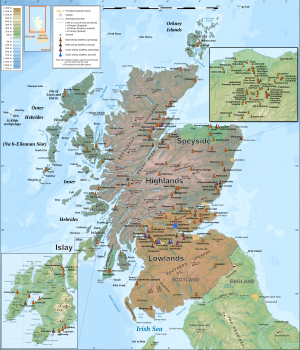List of whisky distilleries in Scotland facts for kids
Scotland is famous for its amazing Scotch whisky. A distillery is a special factory where whisky is made. As of March 2023, there were 143 places in Scotland licensed to make Scotch whisky! That's a lot of distilleries, showing how important whisky is to Scotland.
Contents
What are Whisky Distilleries?
A whisky distillery is where all the magic happens to turn simple ingredients into delicious Scotch whisky. They use water, barley, and yeast. The process involves malting, mashing, fermentation, and distillation. After that, the whisky ages in wooden barrels for many years. This aging process gives Scotch whisky its unique taste and color.
Scotland's Whisky Regions
Scotland is divided into different areas, or "regions," for whisky making. Each region often has its own style of whisky. This is because of local traditions, water sources, and even the climate. The main regions are:
- Speyside: This area has the most distilleries. Whiskies from here are often fruity and sweet.
- Highland: This is a very large region. Whiskies can be light and floral or rich and smoky.
- Lowland: These whiskies are usually lighter and smoother.
- Islay: This island is famous for its very smoky and peaty whiskies.
- Campbeltown: Once a big whisky town, it now has a few distilleries making full-bodied whiskies.
- Islands: This unofficial region includes islands like Arran, Jura, and Orkney. Their whiskies are very varied.
Some Operating Distilleries
Many distilleries are busy making whisky right now. They come in all shapes and sizes. Some are very old, while others are quite new. Here are a few examples of places making different kinds of Scotch whisky:
Malt Whisky Distilleries
Malt whisky is made using only malted barley. It's a very traditional way to make whisky.
| Distillery | Location | Region | Founded | Owner |
|---|---|---|---|---|
| Aberfeldy | Aberfeldy | Highland | 1896 | Bacardi |
| Ardbeg | Port Ellen | Islay | 1815 | LVMH |
| Arran | Lochranza | Island | 1995 | Isle of Arran Distillers Ltd. |
| Auchentoshan | Dalmuir | Lowland | 1823 | Beam Suntory |
| Balvenie | Dufftown | Speyside | 1892 | William Grant & Sons |
| Bowmore | Bowmore | Islay | 1779 | Beam Suntory |
| Clydeside | Glasgow | Lowland | 2017 | Morrison Glasgow Distillers |
| Dalmore | Alness | Highland | 1839 | Whyte & Mackay |
| Glenfiddich | Dufftown | Speyside | 1886 | William Grant & Sons |
| Glengoyne | Dumgoyne | Highland | 1833 | Ian Macleod Distillers |
| Glenlivet | Ballindalloch | Speyside | 1824 | Chivas Brothers |
| Glenmorangie | Tain | Highland | 1843 | LVMH |
| Glen Scotia | Campbeltown | Campbeltown | 1832 | Loch Lomond Group |
| Highland Park | Kirkwall | Island | 1798 | Edrington |
| Jura | Craighouse, Jura | Island | 1810 | Whyte & Mackay |
| Lagavulin | Port Ellen | Islay | 1816 | Diageo |
| Macallan | Craigellachie | Speyside | 1824 | Edrington |
| Oban | Oban | Highland | 1794 | Diageo |
| Springbank | Campbeltown | Campbeltown | 1828 | J & A Mitchell & Co Ltd. |
| Talisker | Carbost, Isle of Skye | Island | 1830 | Diageo |
Grain Whisky Distilleries
Grain whisky is made using a mix of grains, not just barley. It's often used to make blended whiskies.
| Distillery | Location | Founded | Owner |
|---|---|---|---|
| Cameronbridge | Fife | 1824 | Diageo |
| Girvan | Girvan | 1963 | William Grant & Sons |
| North British | Edinburgh | 1885 | Diageo/Edrington |
| Strathclyde | Glasgow | 1927 | Chivas Brothers |
Closed Distilleries
Over time, some distilleries close down. This can happen for many reasons, like changes in demand or economic challenges. Sometimes, their buildings are used for other things. For example, the Dallas Dhu in Speyside closed in 1983 but is now a museum where you can learn about whisky making!
See also
- Scotch whisky
- List of historic whisky distilleries
- List of whisky brands
- Outline of whisky
 | Janet Taylor Pickett |
 | Synthia Saint James |
 | Howardena Pindell |
 | Faith Ringgold |


